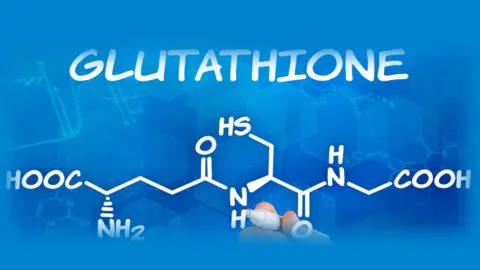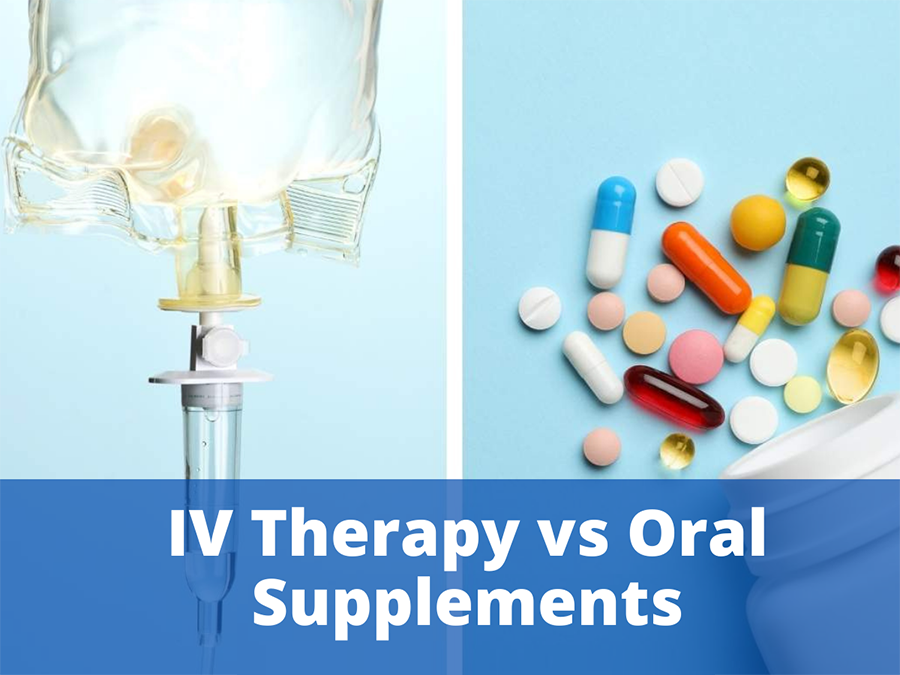
Overview
Glutathione is an antioxidant produced in cells. It’s comprised largely of three amino acids: glutamine, glycine, and cysteine.
Glutathione levels in the body may be reduced by a number of factors, including poor nutrition, environmental toxins, and stress. Its levels also decline with age.
In addition to being produced naturally by the body, glutathione can be given intravenously, topically, or as an inhalant. It’s also available as an oral supplement in capsule and liquid form. However, oral ingestion of glutathione may not be as effective as intravenous delivery for some conditions.
Glutathione benefits
- Reduces oxidative stress: Oxidative stress occurs when there’s an imbalance between the production of free radicals and the body’s ability to fight them off. Too-high levels of oxidative stress may be a precursor to multiple diseases. These include diabetes, cancer, and rheumatoid arthritis. Glutathione helps stave off the impact of oxidative stress, which may, in turn, reduce disease.
- An article cited in Journal of Cancer Science and Therapy indicated that glutathione deficiency leads to increased levels of oxidative stress, which might lead to cancer. It also stated that elevated glutathione levels raised antioxidant levels and resistance to oxidative stress in cancer cells.
- May improve psoriasis : A small study indicated that whey protein, when given orally, improved psoriasis with or without additional treatment. Whey protein had been previously demonstrated to increase glutathione levels. Study participants were given 20 grams as an oral supplement daily for three months. Researchers stated that more study is needed.
- Reduces cell damage in alcoholic and nonalcoholic fatty liver disease : Cell death in the liver may be exacerbated by a deficiency in antioxidants, including glutathione. This can lead to fatty liver disease in both those who misuse alcohol and those who don’t. Glutathione has been shown to improve protein, enzyme, and bilirubin levels in the blood of individuals with alcoholic and nonalcoholic chronic fatty liver disease.
- A study reported that glutathione was most effective when given to people with fatty liver disease intravenously, in high doses. Participants in the study also showed reductions in malondialdehyde, a marker of cell damage in the liver.
- Another small study found that orally administered glutathione had positive effects on people with nonalcoholic fatty liver disease following proactive lifestyle changes. In this study, glutathione was provided in supplement form in a dose of 300 milligrams per day for four months.
- Improves insulin resistance in older individuals: As people age, they produce less glutathione. Researchers at Baylor School of Medicine used a combination of animal and human studies to explore the role of glutathione in weight management and insulin resistance in older individuals. Study findings indicated that low glutathione levels were associated with less fat burning and higher rates of fat storing in the body.
- Older subjects had cysteine and glycine added to their diets to increase glutathione levels, which spiked within two weeks, improving insulin resistance and fat burning.
- Increases mobility for people with peripheral artery disease Peripheral artery disease occurs when the peripheral arteries become clogged by plaque. It most commonly happens in the legs. One study reported that glutathione improved circulation, increasing the ability of study participants to walk pain-free for longer distances. Participants receiving glutathione rather than a saline solution placebo were given intravenous infusions two times daily for five days, and then analyzed for mobility.
- Reduces symptoms of Parkinson’s disease Parkinson’s disease affects the central nervous system and is defined by symptoms such as tremors. It currently has no cure. One older study documented intravenous glutathione’s positive effects on symptoms such as tremors and rigidity. While more research is needed, this case report suggests that glutathione may help reduce symptoms, improving quality of life in people with this disease.
- May help fight against autoimmune disease The chronic inflammation caused by autoimmune diseases can increase oxidative stress. These diseases include rheumatoid arthritis, celiac disease, and lupus. According to one study, glutathione helps reduce oxidative stress by either stimulating or reducing the body’s immunological response. Autoimmune diseases attack the mitochondria in specific cells. Glutathione works to protect cell mitochondria by eliminating free radicals.
- May reduce oxidative damage in children with autism Several studies, including a clinical trial reported in Medical Science Monitor, indicate that children with autism have higher levels of oxidative damage and lower levels of glutathione in their brain. This increased susceptibility to neurological damage in children with autism from substances such as mercury.
- The eight-week clinical trial on children aged 3 to 13 used oral or transdermal applications of glutathione. Autistic symptom changes were not evaluated as part of the study, but children in both groups showed improvement in cysteine, plasma sulfate, and whole-blood glutathione levels.
- May reduce the impact of uncontrolled diabetes Long-term high blood sugar is associated with reduced amounts of glutathione. This can lead to oxidative stress and tissue damage. A study found that dietary supplementation with cysteine and glycine boosted glutathione levels. It also lowered oxidative stress and damage in people with uncontrolled diabetes, despite high sugar levels. Study participants were placed on 0.81 millimoles per kilogram (mmol/kg) of cysteine and 1.33 mmol/kg glycine daily for two weeks.
- May reduce respiratory disease symptoms :N-acetylcysteine is a medication used to treat conditions such as asthma and cystic fibrosis. As an inhalant, it helps to thin mucus and make it less paste-like. It also reduces inflammation. N-acetylcysteine is byproduct of glutathione.
Glutathione is found in some foods, although cooking and pasteurization diminish its levels significantly. Its highest concentrations are in:
raw or very rare meat
unpasteurized milk and other unpasteurized dairy products
freshly-picked fruits and vegetables, such as avocado, and asparagus.
Forms
Glutathione contains sulfur molecules, which may be why foods high in sulfur help to boost its natural production in the body. These foods include:
cruciferous vegetables, such as broccoli, cauliflower, Brussels sprouts, and bok choy allium vegetables, such as garlic and onions
- eggs
- legumes
- lean protein, such as fish, and chicken
Other foods and herbs that help to naturally boost glutathione levels include:
- Milk thistle
- Flaxseed
- Guso seaweed
- Whey
- Glutathione is also negatively affected by insomnia. Getting enough rest on a regular basis can help increase levels.
- Abdominal cramps
- Bloating
- Trouble breathing due to bronchial constriction
- Allergic reactions, such as rash
Side effects and risks
A diet rich in glutathione-boosting foods does not pose any risks. However, taking supplements may not be advisable for everyone. Talk to your doctor about glutathione to determine if it’s right for you. Possible side effects may include:
Takeaway
Glutathione is a powerful antioxidant that’s made in the body’s cells. Its levels decrease as a result of aging, stress, and toxin exposure. Boosting glutathione may provide many health benefits, including reduction of oxidative stress.
Source :https://www.healthline.com/health/glutathione-benefits#glutathione-benefits
Recent Posts
-

Anti-Aging IV Drip Therapy Benefits and How It Works
Ageing is a natural biological process that affects every living organism over time. As humas, when we age, cellular repair slows down, hydration levels decrease, oxidative stress increases, and essential nutrient absorption becomes less efficient.
January 24, 2026 -

IV Therapy vs Oral Supplements: Which Is More Effective?
Many people take daily supplements because they feel like a part of their routine, but the body does not process every tablet the way anyone expects or believes it does. Some days, absorption can be steady; other days, it can't be guaranteed, for reasons that have little to do with the dose itself... Read more
January 21, 2026 -

Types of STD Tests: Blood, Urine, Swab and Rapid Tests Explained
STD testing is considered essential for early detection, accurate diagnosis, and effective treatment of sexually transmitted infections. Many STDs show little or no symptoms, making regular screening an important part of sexual health and wellbeing ... Read more
January 16, 2026 -

How Modern Labs Detect STDs: The Science Behind the Tests
Sexually transmitted infections can often stay silently in the body, sometimes creating subtle changes that leave a person uncertain about what is happening. Modern diagnostics and STD/ STI lab tests help bring clarity by studying tiny pathogens that the body is being exposed to long before it becomes an actual health risk.
January 06, 2026 -

Multivitamin IV Drip: How Beneficial Are They?
A Multivitamin IV Drip is a sterile infusion that combines nutrients such as vitamin C, B-complex vitamins, magnesium, and calcium in a balanced, hydrating solution. At Health Call, this popular treatment is used to support overall hydration ...
December 10, 2025




